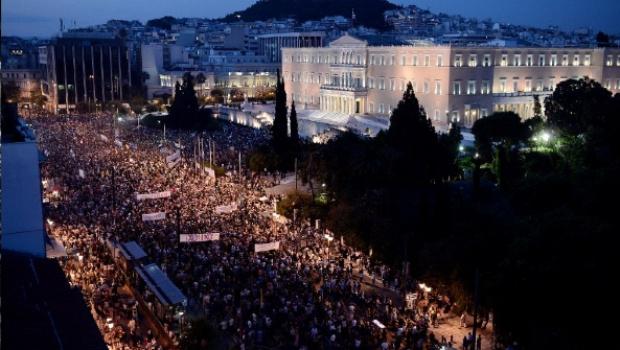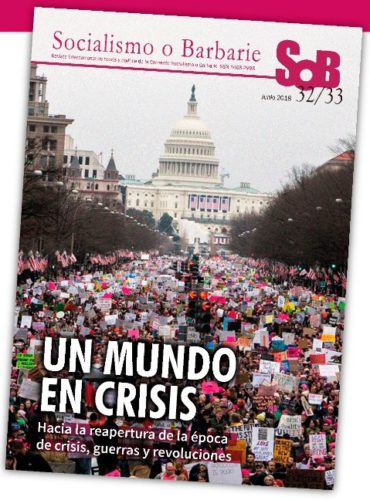
Critical vote for the NO!
Exit the euro takeing anticapitalist measures!
No agreement with the adjusters! No confidence on Tsipras!
Everyone to the streets to impose a program in service of the workers and the greek people!
After five months of negotiations with the Troika, at the closing of this edition Syriza’s call for a referendum was still holding up. With it, the greek people will be adressed about the demands presented by the creditors. To those, they must answer for the “YES” or for the “NO”. This event, that objectively implicates a deepening in the political, financial and economical crisis around the greek debt, in the end, concerns wether the country will still be tied to the diktats from the european imperialist organisims or if the basis for an independent path will be created.
Tsipras’s dead end.
Negotiations with the Troika where a big fiasco, marked by Tsipras’s constant concessions and the clear will by the “institutions” to sink the greek people not only economically but also politically. Far from showing “Europe is a place for negotiation and mutually beneficial agreements” (as Tsipras had declared after his scandalous capitulation on February 20th) the negotiations revealed the true face of the European Union and its allies: a series of institutions that serve the grand capital and the imperialist governments, whose only objective is to drain Greece to the last penny.
That’s the reason the agreement was frustrated even when the main analysts thought it was only a matter of time and that on Friday it was “only a few million euros away” of happening. The Troika, emboldened by Tsipras’s continued concessions, went for a crushing political defeat, a humiliation that serves as an example to anyone – mainly Spain under an eventual “Podemos” government – that dares to dispute even a coma of the UE austerity programs.
The denial to call for a mobilization.
Some see the call for a referendum as a proof of “Tsipras’s struggle against the EU”, a true “democratic” action to face the attacks from imperialist institutions…
In reality, there was no such struggle against the EU. The agreement presented by the Greek part on Monday 22nd of June to the Troika included essential antipopular measures as : retirement reforms, VAT increase, more privatizations, primary budget surplus, etc.
Undoubtable, Troika’s proposition was even worse: a stronger increase in VAT, denial of any discussion concerning the restructuration of the debt; etc. It was clearly a program that aimed to unload the crisis on the working class even more, leaving the big fortunes untouched. But that doesn’t hide the fact that the agreement presented by Tsipras crossed all the “government red lines”; agreement that Syriza’s Left Platform (the left wing of the party) correctly qualified as “worse than previous memorandums”.
The call for a referendum is not by itself a “proof of democratic courage”, but a contradictory event. On one hand, it expresses that the pressure from the workers and the Greek people, that began to protest, prevented a direct capitulation. The Troika went too far and tried to impose humiliating conditions that would have meant the immediate political suicide of Tsipras and Syriza. For months Tsipras repeats he wants to capitulate, but the Troika offered him an unacceptable capitulation!
Paul Krugman, Nobel Price in Economy, is right when he says the Troika was a worse mobster than Don Corleone, the character from “The Godfather”, because it made an offer he can only refuse.
On the other hand, the call for a referendum is also the result of important internal pressure and the growing discontentment among sectors of the Greek population. When the government presented its proposal on 22nd June, the Left Platform (a current within Syriza) criticized him harshly and claimed it would vote against if presented in parliament.
At the same time, the referendum is also a risk. Because, since taking office, the majority leadership of Syriza has systematically refused to call to the mobilization, something that would be in order now. Had the workers and people been called to the streets, the answer would have been overwhelming… stronger than any referendum. But now the problem is whether the referendum is won or not; many polls indicate that “YES” is ahead.
That way, Tsipras’s capitulation strategy might lead to the defeat of the referendum itself. This defeat is based on the fact that Syriza’s supporting point has always been the democratic-bourgeois electoralism, never the direct mobilizations of working and popular masses.
Crisis at the heart of Syriza
Syriza’s majoritarian leadership might have been able to pass on the agreement with the support of pro-Europeans such as To Potami (“The River”, an ultra-neoliberal party) and New Democracy and the PASOK, the former government. But such a parliamentary victory, with the opposition of nearly half of Syriza and the support of the most rancid of the old politicians that sunk Greece in the current catastrophe, would have been a Pyrrhic victory. It would have set off a political crisis and left Syriza on the brink of rupture.
This situation is a reflex of the general mood of the working class and the Greek people, growingly hostile to the agreement, which has pushed the Left Platform to oppose Tsipras, and Tsipras himself to call for the referendum. The tens of thousands of people that mobilized this Monday 29th June for the “NO” prove it.
In addition, the referendum has the objective of improving Syriza’s position in the negotiations, not fighting and even less so, break from the Troika executioners.
Alex Tsipras declared on Monday 29 that “the stronger the participation and the “NO” option, the stronger our position in the negotiation will be”. And that “our objective is that the referendum, a political option, helps us to carry on the negotiations”.
Minister Varoufakis added that “if an acceptable agreement is presented to us, it would be no problem to ask for the “YES” in the referendum”. So, the referendum has no perspective to end the negotiations and the austerity, but to negotiate for a few more breadcrumbs.
That’s why Syriza’s government offers no alternative plan. Although they formally call to vote for the “NO”, their total pro-europeism and their denial to undertake any profound measure turn the calling into an abstraction. While the EU develops a terrorist campaign for the “YES”, Syriza’s government offers no alternative solution. Let’s not forget that these negotiations aren’t “free of charge”: in this five months, Syriza’s government has paid 1.800 million to the IMF, and over 5.000 million euros fled the country under the pressure of the “Grexit” perspective, that is, Greece leaving the euro.
______________________________
We call to critically vote for the NO – A massive worker and popular mobilization is needed
Beyond the considerations raised in this pages, the referendum is a fact (Syriza’s goverment has just confirmed it yet again at the end of this edition). And it’s based on the material facts that revolutionary policy is made.
Tsipras works against the NO
In Tsipras’s hands, the referendum is a huge risk, a way to disregard the situation and leave the Greek people at the mercy of the European Union terror campaign. The referendum is also dangerous, because it dilutes the vanguard, active layers of the population that have been the heart of the great struggles of the past years, in a mass of passive, rearguard elements, susceptible to imperialist propaganda or to be terrorized by it.
And it’s even more dangerous because Tsipras’s constant policy of making a new proposition every hour, only confuses and undermines the foundations of the “NO” campaign.
So, even if the majority of the Greek people has little love for the Troika (except for the capitalists, who benefit from the crisis and austerity, the big businessmen and the mercenaries under Troika’s service), there’s the risk that the terror campaign from the EU and its acolytes within the country and the confusion raised by Tsipras’s everyday somersaults, may tip the scale for the “YES” as the lesser evil.
Our policy is not calling for a referendum: it’s the construction of a wide, massive popular and workers mobilization to tears down the austerity plans of the Troika.
Yet, the referendum is an objective fact that cannot be ignored. Contradictorily, it’s the result of indirect pressure from the workers and the Greek people, due to the fact that if Tsipras just signed an agreement of unconditional surrender with the Troika, Syriza might break or blow up in the air. On that base, the fight in regards of the referendum is a central element that can’t be diluted in purely abstract considerations about the “need to mobilize” without taking a stance on it: the revolutionaries make politics from the given material conditions, not from those we wish we had.
In that sense, a “NO” victory would mean a defeat for the Troika and its austerity plans. Even if for Syriza it would be just “another card to play” in the negotiations, the “NO” victory might deepen the political crisis that is taking place right now in Greece, and reinforce the struggle for the breaking off of the negotiations with the Troika.
So it is that the very Juncker, leader of the European Commission, has begun the “YES” campaign, calling it “a referendum about Greece’s belonging in the EU” as a threat. The very same PASOK and New Democracy that carried on the austerity policy for many years, call to vote for the “YES”, after rallying a mobilization to demand for the remaining on the Eurozone whatever the cost, and the reduction in syndical liberties…
Meanwhile, the KKE (Greek Communist Party), who likes to pose as “ultra revolutionary” (in reality, it defends ultra-sectarian policy that go against independent mobilization), is calling for an abstention in the referendum. This means taking no side in the actual terrain in which things take place, facing the deadly pressures of Troika’s austerity.
That’s why an important campaign for the “NO” must be put forth. A campaign that does not dilute the fight of the workers and the Greek people in the ballot boxes, but instead sparks a great mobilization against the agreements with the Troika, against the austerity, against the payment of the debt.
We have to be millions in the ballot boxes for the “NO”. And, above all, millions in the streets to continue fighting against the austerity policy and against the dead end of Syriza’s direction
That’s why our “NO” is critical: in no way it means supporting Syriza’s government. It’s another battle in the long war that the Greek workers are waging against the social catastrophe in which the Troika and their allied governments sinks them, a war they are called to multiply on the streets.
For an anticapitalist exit from the euro
If one of the big limitations of Syriza’s direction is the absence of an alternative to what the Troika proposes, the campaign for the “NO” can only gather strength and take hold in wide sectors of the population if it is capable of offering an alternative solution for the Greek exploited and oppressed people.
In that sense, the first steps to take are precisely the break off from negotiations with the Troika, the annulation of the debt payment, and the exit from the euro, the true conduit for the imperialist interests in the country that becomes a straitjacket for the rebooting of the economy in favor the interests of the working class.
No doubt, we have to take anticapitalist measures, without which any rupture with the euro might turn against the very working masses. Because of that, there has to be a fight to nationalize the banks, the foreign trade and the currency exchange, to avoid the bleeding out of capitals from the country, conducted not by the workers or the people, trapped in the “capital controls”, but by the great capitals that send their profits abroad. The taxes on massive consumption items must be abolished, and replaced by progressive taxing on enterprises, big fortunes and key sectors like ship owners and the orthodox church that pay nothing.
Along with those measures, control must be taken in the key sectors of economy: nationalization under workers control, without payment, of the central sectors of national production. Obviously this entails putting a stop to the privatization plans and the reemployment of the workers laid-off in the latest austerity plans.
Doubtlessly, this will not be achieved simply by voting. To uphold this claims, it will be necessary to develop the widest working and popular mobilization, reclaim the fighting spirit of a country that was the protagonist of tens of general strikes in the last few years, that has occupied the squares around the country, and that has begun the fight around the referendum with the mobilization of tens of thousands in Athens.
So, the main struggle in the next days is developing a wide organization from the bottom up, in the places of work and study, and in the popular neighborhoods, to discuss and set forth an alternative in service of the interests of the workers and the Greek people. A « NO » victory would mean a deepening in the political crisis that cuts thru the EU and Syriza’s own government, that might raise the question on who is ruling the country and in the service of whose interests.
Socialism or Barbarism journal N°338, 02/07/15


